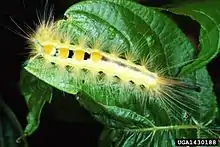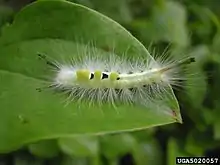Orgyia definita
Orgyia definita, the definite tussock moth or definite-marked tussock moth, is a moth of the family Erebidae. It was first described by Alpheus Spring Packard in 1865.[1] The species is found in eastern North America from Minnesota to New Brunswick and south to South Carolina, Mississippi, and Louisiana.[2][1]
| Orgyia definita | |
|---|---|
 | |
 | |
| Scientific classification | |
| Kingdom: | Animalia |
| Phylum: | Arthropoda |
| Class: | Insecta |
| Order: | Lepidoptera |
| Superfamily: | Noctuoidea |
| Family: | Erebidae |
| Genus: | Orgyia |
| Species: | O. definita |
| Binomial name | |
| Orgyia definita Packard, [1865] | |
The wingspan is about 30 mm for males; females are wingless. Adult males are brown with a darker pattern and some white markings.
The larvae feed on Salix, Quercus, Tilia, Ulmus, Betula, Acer rubrum, and Hamamelis virginiana. They have a yellow head, prothoracic plate and dorsal glands. The body is covered in whitish hairs and the verrucae (wart-like structures on the body) are pale yellow.
%252C_Larva_-_Guelph_03.jpg.webp)
Larva in Guelph, Ontario, Canada
References
- "930166.00 – 8314 – Orgyia definita – Definite Tussock Moth – Packard, 1864". North American Moth Photographers Group. Mississippi State University. Retrieved May 16, 2020.
- Bartlett, Troy (June 20, 2018). "Species Orgyia definita - Definite Tussock Moth - Hodges#8314". BugGuide. Retrieved May 16, 2020.
This article is issued from Wikipedia. The text is licensed under Creative Commons - Attribution - Sharealike. Additional terms may apply for the media files.